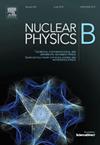Exploring geodesics, quantum fields and thermodynamics of Schwarzschild-AdS black hole with a global monopole in non-commutative geometry
IF 2.8
3区 物理与天体物理
Q2 PHYSICS, PARTICLES & FIELDS
引用次数: 0
Abstract
This work presents a comprehensive analysis of the geodesic motion, scalar field perturbations, and thermodynamic behavior of a static, spherically symmetric black hole solution arising within the framework of non-commutative geometry and incorporating the presence of a global monopole. The study is motivated by the interplay between quantum gravity effects (modeled via non-commutative geometry) and topological defects such as global monopoles, both of which contribute to significant deviations from classical black hole solutions. We begin by formulating the effective potential governing the motion of test particles-both massive and massless-in the modified spacetime. The effects of the non-commutative parameter and the global monopole are systematically examined in the context of various key features: the photon sphere radius, light deflection angle, stability of circular orbits, and the innermost stable circular orbit (ISCO). Our results show that the presence of the non-commutative structure enlarges the photon sphere radius and increases the deflection of light, while simultaneously destabilizing circular orbits. Furthermore, we observe that the ISCO radius is highly sensitive to the global monopole parameter, with a noticeable increase for certain ranges of the non-commutative parameter. These findings suggest that non-commutative geometry and topological defects significantly affect the observable properties of black hole environments. In the second part of the study, we explore linear perturbations of a massless scalar field by solving the Klein-Gordon equation in the background spacetime. The resulting effective potential for scalar perturbations is shown to be deeply influenced by both the non-commutative geometry and the global monopole, modifying the scattering and decay characteristics of the scalar field. By employing the eikonal approximation, we compute the complex quasinormal mode (QNM) frequencies and analyze how their real and imaginary parts evolve with changes in the underlying parameters. The results provide insight into the stability of the black hole under perturbations and offer potential observational signatures of non-commutative and monopole-induced corrections. Finally, the thermodynamic properties of the black hole are investigated. We derive the expressions for the Hawking temperature, specific heat, and Gibbs free energy, showing how these quantities deviate from their counterparts in the standard Schwarzschild solution. Notably, we find that the introduction of a non-commutative structure and global monopole leads to non-trivial modifications in the thermodynamic phase structure. In particular, the black hole may exhibit modified thermal stability and phase transitions depending on the values of the non-commutative and monopole parameters.
在非交换几何中探索具有全局单极子的史瓦西- ads黑洞的测地线、量子场和热力学
这项工作提出了一个全面的分析的测地线运动,标量场扰动,和热力学行为的静态,球对称黑洞解决方案产生的框架内的非交换几何,并纳入一个整体单极子的存在。这项研究的动机是量子引力效应(通过非交换几何建模)和拓扑缺陷(如全局单极子)之间的相互作用,这两者都导致了与经典黑洞解的显著偏差。我们首先制定了在修正时空中控制测试粒子(包括有质量粒子和无质量粒子)运动的有效势。在光子球半径、光偏转角、圆轨道稳定性和最内层稳定圆轨道(ISCO)等关键特征的背景下,系统地考察了非交换参数和全局单极子的影响。我们的研究结果表明,非交换结构的存在扩大了光子球半径,增加了光的偏转,同时破坏了圆轨道的稳定。此外,我们观察到ISCO半径对全局单极子参数高度敏感,在非交换参数的一定范围内显著增加。这些发现表明,非交换几何和拓扑缺陷显著影响黑洞环境的可观测性质。在研究的第二部分,我们通过在背景时空中求解Klein-Gordon方程来探索无质量标量场的线性摄动。结果表明,标量扰动的有效势深受非交换几何和全局单极子的影响,从而改变了标量场的散射和衰减特性。我们利用eikonal近似计算了复拟正态模态(QNM)频率,并分析了它们的实部和虚部是如何随底层参数的变化而变化的。这些结果提供了对扰动下黑洞稳定性的深入了解,并提供了非对易和单极子诱导修正的潜在观测特征。最后,对黑洞的热力学性质进行了研究。我们推导出了霍金温度、比热和吉布斯自由能的表达式,展示了这些量与标准史瓦西解中的对应量是如何偏离的。值得注意的是,我们发现非交换结构和全局单极子的引入导致了热力学相结构的重大改变。特别是,根据非交换和单极参数的值,黑洞可能表现出改变的热稳定性和相变。
本文章由计算机程序翻译,如有差异,请以英文原文为准。
求助全文
约1分钟内获得全文
求助全文
来源期刊

Nuclear Physics B
物理-物理:粒子与场物理
CiteScore
5.50
自引率
7.10%
发文量
302
审稿时长
1 months
期刊介绍:
Nuclear Physics B focuses on the domain of high energy physics, quantum field theory, statistical systems, and mathematical physics, and includes four main sections: high energy physics - phenomenology, high energy physics - theory, high energy physics - experiment, and quantum field theory, statistical systems, and mathematical physics. The emphasis is on original research papers (Frontiers Articles or Full Length Articles), but Review Articles are also welcome.
 求助内容:
求助内容: 应助结果提醒方式:
应助结果提醒方式:


